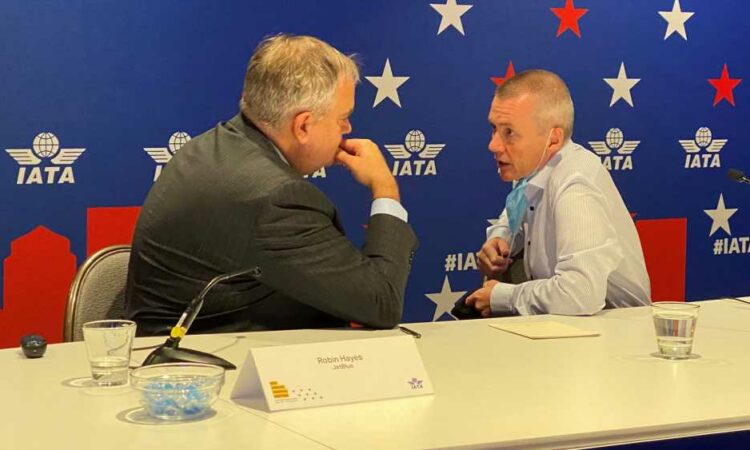BOSTON — An analysis published by IATA during its two-day general meeting here painted a bleak picture about the web of complexity that awaits international travelers.
“The situation can’t continue,” IATA deputy director general Conrad Clifford said. “Governments claim to be following the science, but the science can’t possibly justify such a wide range of restrictions and rules.”
In the report, IATA analyzed Covid-related entry policies for the countries that comprise the 50 largest passenger markets and found that just seven have no restrictions on who can enter. Another five will let anyone in, but with the potential for mandatory quarantines. The remaining 38 countries have a confusing mix of policies on everything from vaccination requirements to testing and more.
Testing rules provide a particularly sharp example of the complexities. According to IATA, 46 of the countries surveyed require predeparture testing for at least some passengers. Of those, 24 only accept PCR tests while 16 allow rapid antigen tests.
And even among the 16 nations that allow antigen tests, three will require PCR tests from certain groups of passengers, such as those coming from high-risk countries.
Additionally, IATA found that 33 countries exempt children from testing, but with no consistency on age. Another 20 countries provide exemptions from testing for travelers who have recovered from the virus, but again with varying conditions, including how to prove prior infection.
A similar web of rules exists related to vaccination requirements. IATA found that of the 20 countries that are exempting or plan to exempt all vaccinated individuals from entry restrictions, only six have thus far said they will allow unvaccinated minors to enter when traveling with vaccinated adults. Nine countries, IATA added, don’t recognize all seven Covid-19 vaccines that have been approved by the World Health Organization.
Another potential cause of confusion is country-by-country risk categorizations. IATA reports that 24 countries are applying varying entry rules for individuals depending upon the Covid-19 risk profile of their origin country. But among those 24 countries, there is no standardization as to which countries present higher risks.
When will we see global airline passenger traffic recover fully? The forecast is cloudy.
Slower recovery now projected
The lack of international alignment on Covid-19 protocols is one major reason why IATA now foresees a slower recovery for the global airline industry than it did during its previous forecast, made last spring. In an outlook unveiled at the meeting, it projected that airlines will carry 3.4 billion passengers in 2022, which would be 75.5% of the 2019 count. That compares with IATA’s May estimate that airlines would carry 88% of the 2019 passenger count in 2022.
Demand for international flying, measured by the number of miles flown by paying airline passengers, will be especially weak, reaching just 44% of the 2019 level.
During his opening address at the conference, IATA director general Willie Walsh pointed to the robust rebound in domestic flying as evidence that travel restrictions, rather than lack of demand, are what is holding back international recovery.
IATA projects that domestic demand around the world will be 93% of the 2019 level next year and that it will end this year at 73% of 2019’s level.
Walsh also cited testing results for U.K. arriving passengers as evidence that many existing travel restrictions are unnecessary. Of the approximately 3 million U.K. arrivals between February and August, just 42,000 tested positive for Covid-19, barely more than the current daily U.K. case count, which remains above 30,000.
IATA used the meeting last week to continue its call for world governments to harmonize Covid-19-related entry rules.
Its position is that vaccinated individuals should face no barriers to travel. For everyone else, the trade group argues, rapid antigen tests should be offered free of charge, with negative results allowing for quarantine-free travel.
Such pleas, however, have fallen on deaf ears in numerous countries for many months. In Boston, IATA leaders conceded that it is unlikely their efforts will bring about a global agreement of travel rules.
Still, Clifford outlined the trade group’s immediate strategy, which involves making its case at the International Civil Aviation Organization’s (ICAO) High Level Conference on Covid-19 this month. The hope, he said, is that the ICAO, which is the civil aviation arm of the United Nations, will produce a declaration highlighting the need for harmonization.
If it does, IATA will take that declaration to individual governments and present its case.
Source: Read Full Article

